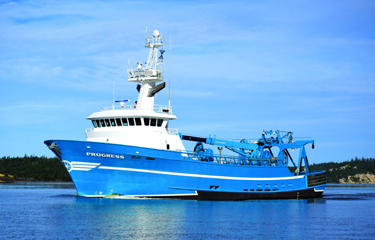Two Alaska Community Development Quota groups have partnered with Maruha Nichiro to purchase nine pollock-fishing vessels, inshore pollock quota, and processing capacity from Evening Star Fisheries and Cooke-owned Icicle Seafoods.
Alaska’s Norton Sound Economic Development Corp. and Coastal Villages Region Fund announced its acquisition of four percent of Bering Sea pollock quota on Tuesday, 1 February, along with an expansion of their partnership with Tokyo, Japan-based Maruha Nichiro to catch and process Bering Sea pollock quota. The investment by the two CDQ groups accounts for 75 percent ownership of the fishing quota, while Maruha Capital Investment is a 25 percent stakeholder (the company’s holding is limited by the American Fisheries Act, which limits foreign ownership of fishing vessels fishing in U.S. waters). The acquisition also includes nine fishing vessels from Evening Star Fisheries. The fleet, which includes the recently rebuilt F/V Progress, can operate in both the Bering Sea and Gulf of Alaska. Terms of the deal were not disclosed due to a confidentiality agreement signed between the parties.
“Partnering with NSEDC, this deal … will help to provide more opportunity for future generations. We owe it to our predecessors to continue their legacy and continue increasing our benefits and services to our region residents,” Coastal Villages Region Fund Chairman Larson Hunter said.
The expanded partnership brings the total inshore pollock quota owned by the three companies to just over 8 percent of the overall non-CDQ fishery in the Bering Sea. The two CDQ companies own 75 percent of the combined operations, and are the managers of the vessels and fishing activities.
Additionally, Westward Seafoods, a subsidiary of Maruha Capital Investment, purchased whitefish processing assets from Icicle Seafoods and Evening Star – principally the Northern Victor, a processing plant permanently moored in Dutch Harbor, Alaska. Westward Seafoods also operates two other processing plants in the region.
Maruha Nichiro divested itself of Alaska salmon operations when it sold Peter Pan Seafoods to a suite of new owners in 2020.
“The replacement of assets in the processing business has been completed, and in the future, Alaska pollock will be the main business of the group in North America,” Maruha Nichiro said in a 2 February press release. It said it “will make improvements and strive to further improve production efficiency.”
Demand for pollock is projected to grow, and access to the resource is limited worldwide, making the acquisition of access to additional sourcing a rare opportunity, the company said.
“As a sustainable protein source that is relatively cheaper than resources and can be supplied to the market in large quantities, it is expected to become more and more important to humankind,” Maruha Nichiro said.
Maruha Nichiro also highlighted the transaction’s potential to contribute to the development of the regional economy.
“Maruha Nichiro is pleased to be able to expand our partnership with NSEDC and Coastal Villages Region Fund,” Westward Seafoods President Mark JoHahnson said. “This new opportunity will allow us to enhance the value of service we bring to all our stakeholders: customers, business partners, shareholders, employees, and the local communities where we operate.”
In 2011, Coastal Villages Region Fund and Siu Alaska, a subsidiary of Norton Sound Economic Development Corp., joined to form BSAI Partners. Together with an affiliate of Maruha Nichiro, the partners purchased six inshore pollock vessels with just over 4 percent of the Bering Sea pollock fishery quota the same year. That partnership has now been extended with the doubling of its quota holdings.
“We are thankful for our continued partnership with NSEDC and Maruha Nichiro to bring more opportunities to Western Alaska through our growing investments in the Bering Sea,” Coastal Villages Region Fund CEO Eric Deakin said. “This expansion by Alaskans in the Bering Sea brings more direct benefits to our communities and gives us a stronger voice in the management and protection of resources for future generations. We’ve had a great partnership with Maruha Nichiro for the past decade and are excited about this expansion.”
The Western Alaska Community Development Quota Program was established under the Magnuson-Stevens Fishery Conservation and Management Act to provide western Alaska villages with the opportunity to participate and invest in fisheries in the Bering Sea and Aleutian Islands fisheries. Six non-profit corporations represent 65 communities with the purpose of economic development in western Alaska and goals to alleviate poverty, provide economic and social benefits to residents, and achieve sustainable local economies. The allocations were implemented in 1992 for pollock, 1995 for halibut and black cod, and 1998 for multispecies groundfish.
Antarctica Advisors served as the advisor to Cooke on the transaction.
"The seafood M&A team at Antarctica Advisors leveraged its knowledge of the pollock sector and its relationships in Alaska and abroad, to successfully negotiate and execute this highly complex transaction, ultimately achieving a strong outcome," Cooke and Icicle Seafoods President and CEO Glenn Cooke said.
Antarctica Advisors Managing Partner Ignacio Kleiman said the acquisition "allows the Cooke family of companies to continue focusing on higher value-added seafood resources by redeploying capital, while substantially enhancing Maruha's leading position in the Alaskan pollock fishery," Kleiman said.
"Furthermore, this deal secures substantial resource access for the CDQ groups in an important Alaskan fishery for future generations," he said.
Reporting by Jes Hathaway
Photo courtesy of Fred Wahl Marine Construction







